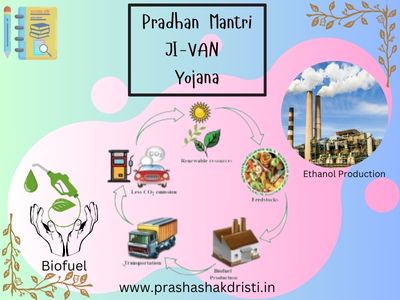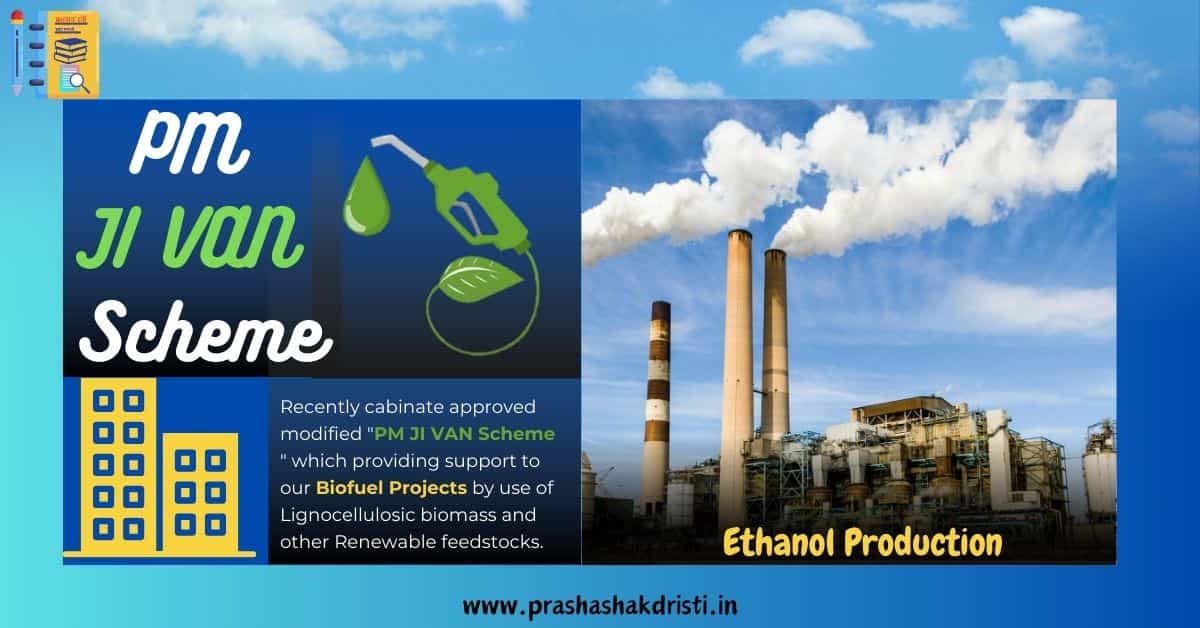The Pradhan Mantri JI-VAN Yojana is an important initiative by the Government of India. It was launched to promote the production of ethanol using second-generation biomass.
Pradhan Mantri JI-VAN Yojana|PM JI VAN Scheme
This program aims to help India become self-reliant in energy production and reduce pollution levels. The term “JI-VAN” stands for “Jaiv Indhan- Vatavaran Anukool fasal awashesh Nivaran,” which translates to “Eco-friendly Fuel from Agricultural Waste.”

Recent Announcement
Recently cabinate approved modified “PM JI VAN Scheme ” which providing support to our Biofuel Projects by use of Lignocellulosic biomass and other Renewable feedstocks.
The modified “PM JI VAN Scheme ” had extended to 5 more year till 2028-2029.
Objective of PM JI VAN Scheme
The main objective of the Pradhan Mantri JI-VAN Yojana is to reduce the dependency on fossil fuels. It aims to increase the production of ethanol using agricultural residues. This ethanol can be blended with petrol and diesel, reducing carbon emissions and making fuel more sustainable.
This scheme is also designed to benefit farmers. It encourages the use of agricultural waste like straw, stalk, and other residues, which would otherwise be burned, causing air pollution. By providing a market for this waste, the scheme helps farmers earn additional income.
Why Ethanol is important?
Ethanol is a biofuel that can be produced from various biomass materials. It is cleaner and more environmentally friendly than traditional fossil fuels. Ethanol blending in petrol and diesel helps in reducing greenhouse gas emissions. It also reduces the country’s dependency on imported crude oil.
The government of India has set an ambitious target to achieve 20% ethanol blending with petrol by 2025. The Pradhan Mantri JI-VAN Yojana plays a crucial role in achieving this target by boosting ethanol production from agricultural waste.
Key Feature of Pradhan Mantri JI-VAN Yojana
Second-Generation Ethanol Production: The scheme focuses on producing ethanol from non-food biomass, mainly agricultural residues. This ensures that food production is not affected while producing biofuel.
Financial Assistance: The government provides financial support for setting up new ethanol production plants. This includes viability gap funding and interest subvention. These incentives make it attractive for companies to invest in ethanol production.
Support to Farmers: The scheme indirectly supports farmers by creating a demand for agricultural residues. This helps farmers earn extra income and reduces the practice of burning crop residues, which is harmful to the environment.
Environmental Benefits: By using agricultural waste to produce ethanol, the scheme helps in reducing air pollution caused by the burning of crop residues. It also contributes to reducing greenhouse gas emissions by promoting the use of clean fuel.
Encouragement for Research and Development: The scheme promotes research and development in the field of biofuels. It encourages innovation in ethanol production technologies and the use of different types of biomass.
What is the Strategy of implementation?
The Pradhan Mantri JI-VAN Yojana is implemented by the Ministry of Petroleum and Natural Gas (MoPNG). The scheme was allocated a budget of Rs. 1969.50 crore for the period from 2018-19 to 2023-24. The scheme is divided into two phases.
Phase I (2018-19 to 2022-23): In this phase, the government focuses on setting up 12 commercial second-generation ethanol plants. These plants will use agricultural residues and other biomass to produce ethanol.
Phase II (2020-21 to 2023-24): This phase will see the establishment of more ethanol plants, with a focus on expanding the technology and infrastructure needed for ethanol production.
What is the benifit of Pradhan Mantri JI-VAN Yojana?
Energy Security: By promoting ethanol production, the scheme reduces India’s dependency on imported crude oil. This contributes to the country’s energy security.
Economic Benefits: The scheme generates employment opportunities in rural areas. It also helps in the economic development of regions where ethanol plants are set up.
Environmental Protection: The scheme helps in reducing air pollution caused by the burning of crop residues. It also reduces greenhouse gas emissions, contributing to the fight against climate change.
Farmers’ Welfare: The scheme provides an additional source of income for farmers by creating a market for agricultural residues. This reduces the practice of burning crop residues, which is harmful to the environment and public health.
Technological Advancement: The scheme encourages the development of new technologies for ethanol production. This can lead to more efficient and cost-effective ways of producing ethanol from biomass.
What are the challenges in Implementation?
Despite its many benefits, the Pradhan Mantri JI-VAN Yojana faces several challenges. One of the major challenges is the high cost of setting up ethanol plants. The technology required for second-generation ethanol production is expensive, which can be a barrier for small and medium enterprises.
Another challenge is the availability of biomass. The collection and transportation of agricultural residues can be difficult, especially in rural areas. There is also the issue of competition for biomass, as it is used for other purposes like animal feed and compost.
The scheme also requires strong coordination between various stakeholders, including farmers, ethanol producers, and the government. Ensuring that all stakeholders are on the same page can be challenging.
What are the future target of PM JI VAN Scheme
The Pradhan Mantri JI-VAN Yojana has a promising future. The government is committed to achieving the target of 20% ethanol blending by 2025. The success of this scheme will be crucial in meeting that target.
There is also potential for expanding the use of ethanol in other sectors, such as aviation and shipping. Research and development in this area could lead to new opportunities for the use of biofuels.
Conclusion
The Pradhan Mantri JI-VAN Yojana is a forward-looking initiative that addresses multiple issues, including energy security, environmental protection, and farmer’s welfare. By promoting the production of ethanol from agricultural residues, the scheme helps reduce pollution and provides economic benefits to farmers.
The success of the Pradhan Mantri JI-VAN Yojana depends on overcoming the challenges it faces. With the right support from the government and active participation from the private sector, this scheme can play a significant role in shaping India’s energy future.
You can read about – Waqf Amendment Bill 2024
FAQs
What is Pradhan Mantri JI-VAN Yojana?
The Pradhan Mantri JI-VAN Yojana is a government initiative aimed at promoting the production of ethanol using second-generation biomass, mainly agricultural residues.
What is the objective of the Pradhan Mantri JI-VAN Yojana?
The main objective is to reduce dependency on fossil fuels by increasing ethanol production, which can be blended with petrol and diesel to make fuel more sustainable.
How does the Pradhan Mantri JI-VAN Yojana benefit farmers?
The scheme creates a market for agricultural residues, helping farmers earn extra income and reducing the need to burn crop residues, which causes pollution.
What are the environmental benefits of the Pradhan Mantri JI-VAN Yojana?
The scheme helps reduce air pollution and greenhouse gas emissions by promoting the use of clean fuel derived from agricultural waste.
What are the challenges faced by the Pradhan Mantri JI-VAN Yojana?
Challenges include the high cost of setting up ethanol plants, the availability and transportation of biomass, and the need for coordination between various stakeholders.

